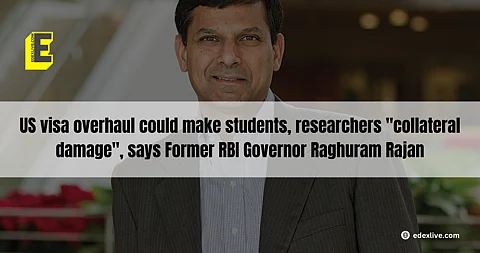

Former RBI Governor and economist Raghuram Rajan has cautioned that US policies under Donald Trump targeting international student visas and American universities could have far-reaching consequences for global higher education.
Speaking to India Today’s Rajdeep Sardesai, Rajan described these actions as “unfortunate,” highlighting their potential to disrupt academic and economic ties between the US and nations like India.
Economic and academic impact
Rajan emphasised the mutual benefits of international education, noting that the US earns $45 billion annually from international students, including significant contributions from India.
“Indian students have gained valuable skills and global exposure, while US universities have benefited financially and academically,” he said. However, restrictive visa policies could deter students, pushing them toward more welcoming countries like Australia or the UK, ultimately harming US institutions.
India's golden opportunity
Despite the challenges, the former RBI governor sees a silver lining for India. He urged increased investment in domestic education to elevate Indian universities to global standards.
Citing China’s success in boosting its academic institutions over the past two decades, he argued that India could seize this moment to enhance its research and development capabilities. “If we focus on investing more in our best universities, we can bring them to a higher plane,” he stated.
Students as collateral damage
Rajan further noted that resistance from American institutions, with Harvard actively opposing the government's policies, might stall medical research and make students and researchers the “collateral damage" of the process.
He shared an anecdote from Singapore, where a university leader reported a 100% acceptance rate for offers to US academics, up from 40%, signalling a potential weakening of US academia.
While US institutions remain active, Rajan cautioned that reputational damage could linger. “People remember, and when offered a choice, they’ll pick where they feel more comfortable,” he said.
